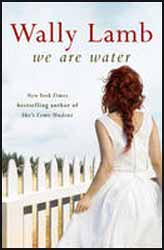|
Click here to return to the main site. Book Review
Anna Oh enjoyed the public life of a successful artist, but her private life was a complex affair. Previously married with children, Anna found love with another woman when she moved to New York. On the cusp of her new marriage, friends and family are starting to congregate, but instead of it being a moment of joy, the collected congregation will peel back Anna exposing a darker side she would rather keep hidden... We are Water (561 Pages) is a new novel by Wally Lamb, an American academic and novelist. The novel is an in-depth look at what it means to be in a family. The basic premise is not overly complex, just a gathering for a wedding, but this is the catalyst for various members of the family to reflect on their experiences of being together, the truths they shared, the lies they told and the things which they preferred to forget. The structure of the book flips between the here and now and past events. The story is told from multiple, first person narrative, perspectives allowing Lamb to examine the differing way the family are viewed through the lens of the individuals own fears and prejudices. Like David Lynch’s opening shot of Blue Velvet, Lamb is stating that behind the polite façade which the family projected there was pain as well as love. The book deals with some difficult issues from child molestation to violence and the characters are presented in a sympathetic way. Now, this may cause some offence to a proportion of readers, but Lamb does not portray them in this way to illicit your sympathy for their actions, rather he is peeking behind their psychological curtain to see how they see themselves. This desire to be truthful extends to many aspects of the novel, including what some may feel are quite graphic descriptions of characters sex lives and acts. For all of its good attributes, I can’t really say that I enjoyed the book. It’s probably true that few of us are totally sympathetic characters, but I found Annie, well..., annoying. Supposedly a great artist, Lamb spends little time in describing how this works, leaving the reader to accept this as fact. Likewise the idea that every family has its dark secrets should just be a given, so the thought that for the majority of the characters there is a chance for redemption just seemed like stating the obvious. It may be that many of the aspects of the novel seem more controversial to a conservative American audience, but for those with a more liberal culture the novel skirts the edge of Harold Robbins territory. 7 Charles Packer Buy this item online
|
|---|



